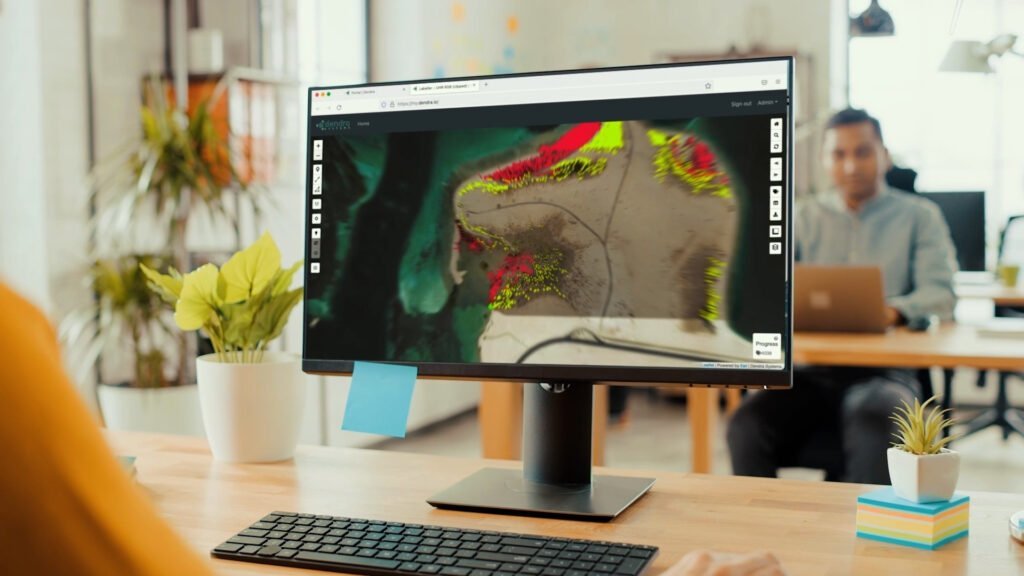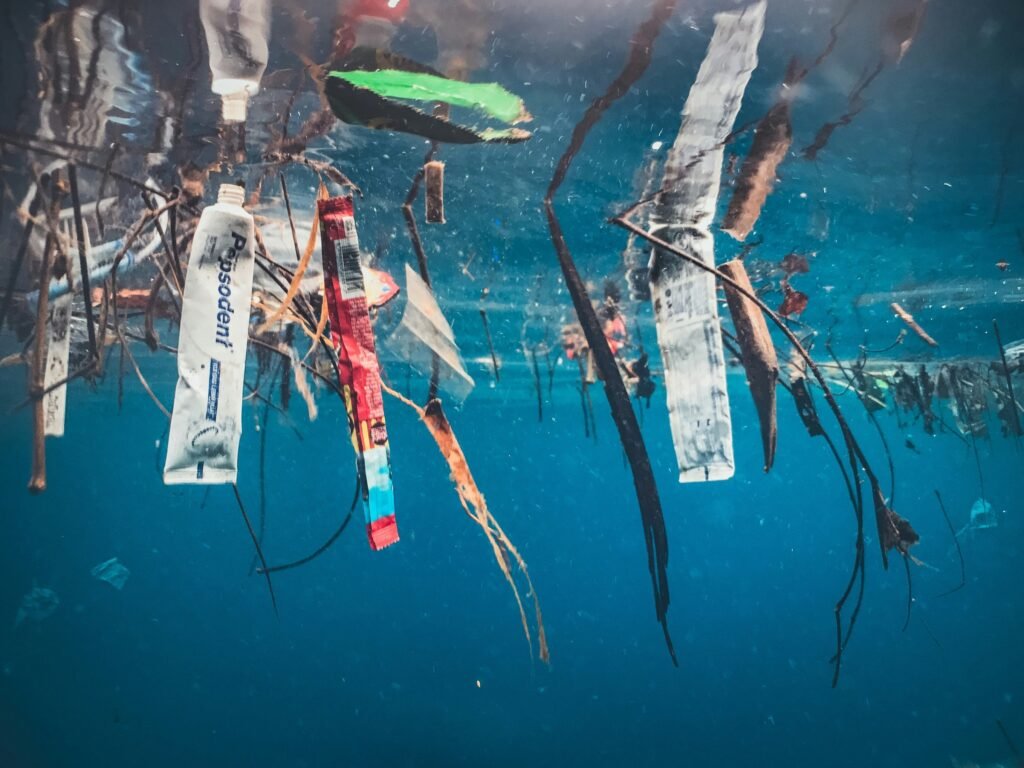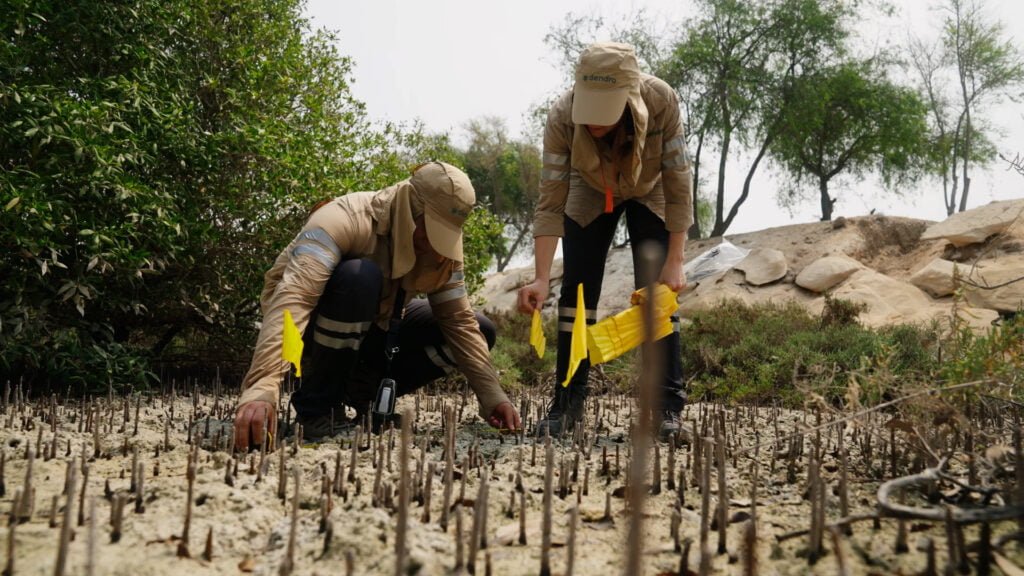Biodiversity loss is taking place at a startling rate. In the last 60 years, global forest area per capita has decreased by over 60 per cent, there has been a 69 per cent drop in wildlife populations in the last 50, and as many as two million animal and plant species are threatened with extinction.
Now, the climate crisis is set to wreak further havoc, with some experts projecting that by 2050, climate change will be the main driver of biodiversity loss.
But ecosystems are intricately and deeply interconnected, and their destruction has wide-reaching and complex implications.
Climate tech Dendra Systems is one of the companies that’s trying to turn back the clock, using data analytics, AI and drones to drive global ecosystem restoration efforts.
ESG Mena met with Dr Susan Graham, co-founder and CEO, to discuss scaling restoration efforts, the company’s projects and their impacts.
Scaling Ecosystem Restoration
Dendra Systems, made up of a team of scientists, ecologists and engineers, was founded back in 2014 by Dr Graham and Matthew Ritchie (CFO) to address the world’s worsening ecological challenges.
Indeed, Dr Graham detailed that biodiversity loss is now ten times higher than it has been in the last 10 million years, carbon dioxide levels are increasing, and land degradation is worsening, which is also putting pressure on livelihoods.
“We see nature as a way to solve each of these complex crises if only we could restore it at scale.”
When the company first began, it found that environmental teams involved with restoration were deploying manual management, monitoring and intervention.
“No wonder you can’t scale that, it’s impossible at the scale that’s required,” said Dr Graham.
In response, Dendra Systems built out its RestorationOS.

“[It’s] a platform that environmental teams can use to get more insights about the projects that they’re carrying out, to be able to make more informed decisions, and to be able to intervene earlier, when challenges arise,” explained Dr Graham.
Today, the company uses a combination of data science, machine learning, and automation across 50 projects in Australia and the UAE, spanning 71k Ha.
According to Dr Graham in the next five to ten years, this will move up into the “many millions of hectares.”
Protecting Vital Coastal Ecosystems
Indeed, when it comes to restoration impact, the bigger, the better, and this is especially true for mangroves, Dr Graham said.
Mangroves are critical ecosystems for the planet and sequester around four times more carbon than rainforests.
“They support biodiversity in the oceans as well as on the land. They act as a natural buffer and asset protection for homes, for infrastructure,” said Dr Graham.
But, despite their importance, mangroves are under threat.
In fact, a recent study from the International Union for Conservation of Nature (IUCN) found that more than half of the world’s mangrove ecosystems are at risk of collapse, and that by 2060, around 16 per cent of mangroves could be submerged.
One of Dendra’s regional projects is supporting Abu Dhabi’s efforts in restoring coastal ecosystems, specifically mangroves.
The project, in partnership with the Environment Agency – Abu Dhabi (EAD) and ADQ, comes under the umbrella of the Abu Dhabi Mangrove Initiative (ADMI).
For its part, Dendra will apply a data-driven approach, providing the technology and services via remote sensing and drone-based seeding, with the goal of optimising restoration activities and improving outcomes, Dr Graham explained.
EAD, meanwhile, will provide data-driven guidance through mangrove specialists and support in land selection, methodology, and local understanding of the native environment.
This, she said, is in addition to the findings of an extensive mangrove restoration survey, which has preliminarily highlighted and ranked areas suitable for plantation and restoration.
Here, Dr Graham emphasised the importance of local community engagement in these projects, calling it “critical” to their long-term success: “[That’s] whether you’re in Australia and engaging the Indigenous custodians of the land, or whether you’re in Abu Dhabi and engaging groups of people who can be involved in the plastic cleanup campaigns.”
Targeting Ocean Pollution, Facilitating Mined Land Restoration
Indeed, plastic pollution is devastating ecosystems, including mangroves, with millions of tonnes entering oceans each year—and it’s only getting worse.

Dr Graham explained that, as part of the mangrove project in Abu Dhabi, which spans 20,000 hectares of coastline, the company also mapped the level of plastic pollution.
The EAD then used this data to coordinate a targeted plastic cleanup.
“They were able to collect 400 kilogrammes in one hour,” she said.
Beyond this, Dr Graham explained that the company has worked across around 20 different ecosystem types, including in the mining context.
From one environmental scourge to another, mining is one of the top drivers of deforestation and biodiversity loss globally and also significantly contributes to soil erosion and contamination.
Indeed, globally, the Earth’s lands are in a sorry state. An estimated 70 per cent of lands have now been altered from their natural state, while up to 40 per cent is degraded. Without action, UNESCO has forecast that 90 per cent of Earth’s surface could be degraded by 2050.
“We operate with some of the largest mining companies in the world, doing mined land rehabilitation,” said Dr Graham, adding that this is often a “complex environment.”
“A lot of that work is often in analysing risks, like invasive plant species, erosion, all the challenges which really impact your ability to get the outcomes that you require,” she explained.
Infrastructure is another area Dendra works in and one which, according to Dr Graham, has a similar disturbance footprint.
However, the company is also exploring “a lot of opportunities” across the MENA region, and this regional expansion will be facilitated, in part, by Dendra’s recent series B funding round.
Navigating the Climate Tech Investment Landscape
Indeed, back in May, the climate tech company announced that it had secured $15.76 million in its Series B funding round.
The round was led by Zouk Capital, with participation from regional investor Aramco Ventures, and others. According to Dr. Graham, it will allow the company to “fully build out” its restoration OS.
However, Dendra’s investment success comes against a backdrop of industry headwinds.
Indeed, global venture capital funding for climate-tech startups slumped 20 per cent in the first half of 2024 compared to 2023, while growth funding dropped 33 per cent.
“Climate tech investment is so important, and it goes through these cycles. The cycle that we’ve most recently been in is a negative dip in the cycle. So, it’s been challenging for a lot of companies to raise capital, particularly at the later stages,” said Dr Graham.

But alongside this dip, she explained that there has been an upskilling in the investor community, with regard to their knowledge of the different opportunities, “not just on the emissions reduction side, but also on the abatement side.”
According to Dr Graham, investment approaches are becoming more holistic: “It’s much broader because, of course, it’s all interlinked.”
“Something which has been evolving, particularly over the last three years, is a real understanding of the importance of biodiversity and nature. So, there is a growing number of investors who are investing in nature tech as a thesis rather than just climate,” she added.
Navigating the Integrity Problem
Indeed, according to Dr. Graham, the market for nature-based solutions is “really shaping up.”
“You’ve got the combination of scientific and academic research being able to support the fundamentals in development, you’ve got a maturing landscape of partners who can all work together, and, then ultimately, the capital that’s driving into it.”
However, Dr. Graham said that while there’s a lot of money earmarked for restoration, the challenge is investing in high-integrity projects.
“The mismatch between supply and demand is a real problem at the moment when we talk about natural restoration,” said Dr Graham. “So we need to improve the integrity of the supply side so that it can demand a higher price, and so that more capital can flow to increase the scale of investment and ultimately impact these projects.”
Indeed, this conversation around integrity is also being discussed in the international negotiations on carbon markets, which are ongoing and the subject of much debate and controversy.
COP29 host Azerbaijan has said Article 6 will be a priority at the climate summit in November.
Commenting on her hopes for the outcome of international negotiations, Dr Graham said that strong, transparent rules are key: “Negotiations should aim to establish clear and robust rules for carbon markets. This includes guidelines for measuring, reporting, and verifying emissions reductions to ensure integrity and trust among participating countries and entities.”
Likewise, she emphasised the need for effective mechanisms for monitoring compliance with commitments and enforcing rules, calling for robust systems for tracking emissions and ensuring that countries and entities meet their obligations under the carbon market agreements.
“It’s crucial that negotiations prioritise fairness and inclusivity,” added Dr Graham, “Particularly for developing countries.”
“This can involve mechanisms for capacity building, technology transfer, and financial support to enable broader participation in carbon markets.”
More broadly, when asked what she would like to see from a policy perspective to better support ecosystem restoration, Dr Graham explained that more governments should set bold targets for large-scale restoration and ensure that, through regulation, corporations are required to actively support this.
The climate tech CEO also underlined the need for corporations already investing in restoration to be “more demanding” about the data that they need to assess progress.
Indeed, speaking about what’s required to create projects that have a lasting and positive impact, Dr Graham said: “The old adage that you can’t manage what you can’t measure really holds true here.
“There are several layers of data that are required. When you don’t have those, you’re really fighting with one hand behind your back,” she added.
“Our platform is to empower the different stakeholders, from finance, from ecological management, through to local community stakeholders, so that everyone can have the transparency and understand the integrity of these projects, and know how they can support and how they can help.”
By Madaline Dunn, Editor, ESG Mena.



